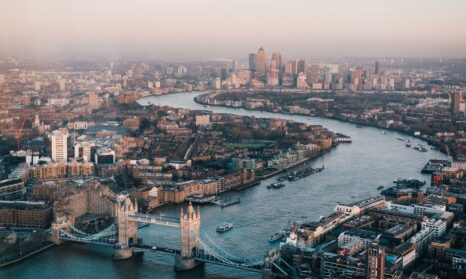Government plans for a new environment bill and green watchdog are a very big deal
The proposed new environment bill is Brexit-related; what isn’t these days? When (if?) we leave the European Union, we will no longer have the European Commission and the European Court of Justice to ensure the UK Government does not break EU environmental laws – which are all being converted into UK law.
So the most important things the bill will do, says Environment Secretary Michael Gove, is to “create a new, world-leading, independent environmental watchdog to hold government to account on our environmental ambitions and obligations once we have left the EU.”
A Government consultation on these proposals is underway and Bioregional, along with dozens of other organisations and individuals, has sent in its views.
Exactly what will be in this bill is far from clear, but the Government says it will give a legal underpinning to its long-stated ambition for this generation to be the first to leave its environment in a better state than it inherited.
That ambition was first set out by the Government seven years ago. But while some things have got better since then (carbon emissions have kept falling), the environment has continued to deteriorate in many important ways, most notably the overall decline in UK wildlife. It is high time the ambition was realised.
Mr Gove deserves praise for getting the Cabinet to back this bill and the new watchdog body. It can’t have been easy. Government departments like to sound green – no one wants to be seen as anti-nature – but they fear and loathe the idea that environmental protection could ultimately trump anything else.
When something they really care about comes along – such as expanding Heathrow, or fracking – they want the environment to come second, every time. An effective watchdog and a strong Environment Act might, on occasion, threaten their freedom of action.
Lack of muscle is one of the severe shortcomings in proposals for the new watchdog
There are some severe shortcomings in the Government’s proposals, put out in May. These are probably the gravest:
- It’s not clear that the Government wants the new watchdog to have serious enforcement muscle. The consultation paper suggests that if the watchdog finds the Government breaking green laws, it could issue advisory notices requesting compliance (!). It might issue binding notices requiring corrective action, or demand that a government department gives it an environmental undertaking to go straight. No mention, though, of fines –the European Court of Justice can heftily fine EU member states that break EU environmental laws (although it has not yet fined the UK).
- The Government proposes that the new arrangements exclude anything to do with climate change, because we already have a UK Climate Change Act and the official Climate Change Committee has a powerful scrutiny role. This is nuts! Climate change is a supremely important environmental issue, it is intimately connected to all other green things, and the Climate Change Committee has no enforcement powers. Don’t leave climate change out.
- The new Act and watchdog might only cover England, not the UK. Granted, lots of green law making and environment policy are devolved to the UK’s constituent nations, but surely they should agree a UK-wide remit for these new, top-level green governance arrangements across their shared environment.
- The new watchdog would have no powers to make Government stick to international environmental treaties.
There’s a fundamental vagueness in the Government’s proposals
There is also a fundamental vagueness in the Government’s proposals. What is the new watchdog’s purpose? The stated top objective is for it to be “a strong, objective, impartial and well-evidenced voice for environmental protection and enhancement.” We already have plenty of voices in the UK and we don’t really need another. What we do need is a cast-iron guarantor of environmental protection and enhancement.
The Government’s consultation paper talks about the body having the task of advising the Government on how well its green policies are working, as well as following green laws. It might be given the job of “publishing an independent, annual assessment of national progress against the delivery of the ambition, goals and actions of the 25 Year Environment Plan.” This is very much the kind of job the Climate Change Committee does in regard to climate change – and it does it pretty well.
But giving the new watchdog this kind of detailed policy advisory/scrutiny role could be a big mistake. 25 Year Environment Plans will come and go…and be changed out of recognition. And let’s not forget that in 2010, the Government abolished two bodies that had just that kind of role: the Royal Commission on Environmental Pollution and the Sustainable Development Commission.
Tracking the implementation and effectiveness of policy takes up a lot of resources, generates lots of activity and paper, and could divert the watchdog from its far more important role as ultimate green guarantor. Are green laws being complied with? Overall, is the environment being protected and enhanced? That’s what it really needs to focus on.
What does it mean for this generation to leave the environment in a better state?
The Government is also proposing that there should be a set of overall environmental principles underpinning environmental regulation and policymaking. These principles will either be in the environment bill itself, or in a separate policy statement mandated by the bill and written afterwards.
What should these principles be? That’s a good question and maybe another blog. But is it not equally important for there to be a set of high-level, high-powered environmental goals set out in law?
If the UK’s aim is to leave the environment in a better state than it is now, what does that actually mean? Let’s define it, then go for it. Several organisations are calling for this, including Bioregional.
This could all get very complex, very quickly, because nature – and people’s interactions with it – is so complicated. Yet any list of statutory green goals needs to be kept as short, as simple and as high-level as possible.
Here are some ideas:
- First, focus the goals entirely on environmental quality and states and outcomes – how clean is the air, freshwaters and seas and soil? How well conserved are key natural resources? How is wildlife doing? Don’t make these goals about processes and policies, such as recycling rates – leave that for more detailed regulation and policy.
- Second, allow one exception to that. Have a statutory goal about people’s engagement with the natural environment. Say something, in law, about loving the environment and finding it beautiful and inspiring.
- Third, make maximum use of internationally and nationally agreed goals and standards that are already out there, rather than inventing new ones. EU law and the World Health Organisation tell us how clean our air needs to be. The Climate Change Act and the Paris Agreement tell us how much we have to reduce our carbon emissions. The UN Sustainable Development Goals give us some powerful green aiming points for 2030.






